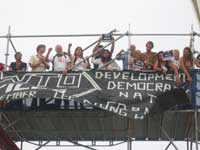WTO talks collapse without agreement
Note the reconciliatory words of Mr. Zoellick towards developing countries.
WTO talks collapse without agreement
By Guy de Jonquières and Frances Williams in Cancún
Financial Times, Monday 15 September 2003
http://www.focusweb.org/index.php?option=news&task=viewarticle&sid=122
 The World Trade Organisation's ministerial meeting in Cancún collapsed in confusion on Sunday after African and Asian countries united to reject demands by the European Union and Japan for rules on investment and other new issues.
The World Trade Organisation's ministerial meeting in Cancún collapsed in confusion on Sunday after African and Asian countries united to reject demands by the European Union and Japan for rules on investment and other new issues.
To whoops of delight from African delegates, Luis Ernesto Derbez, Mexico's foreign minister and chairman of the meeting, declared the talks over. He said there was no basis for any agreement on the disputed issues.
The failure of the five-day talks is a severe blow for the WTO, barely four years after the breakdown of its meeting in Seattle.
However, many ministers said that despite the setback, they remained committed to pressing ahead with the Doha round in some form.
"Whatever happened at this meeting, the pieces will be picked up again," said Celso Amorim, foreign minister of Brazil and leader of a recently-formed group of 22 developing countries that is pressing for reform of wealthy nations' farm trade policies.
"We must find ways to go forward," said Alec Erwin, South Africa's trade minister.
However, Robert Zoellick, US trade representative, said progress would be made only if rich and poor WTO members moved beyond rhetoric and started serious work. "The rhetoric of the 'won't do' overwhelmed the concerted efforts of the 'can do.' 'Won't do' led to the impasse," he said.
"We will now go back to Geneva [the WTO's headquarters]. We will reconvene another ministerial meeting when all the parties are ready," said Rafidah Aziz, trade minister of Malaysia, which has led the opposition to the EU and Japanese demands.
Canada said it would "continue to work on getting this agenda back on track". But Martin Redrado, Argentina's chief trade negotiator, said: "There is no mood to reconvene [the ministerial meeting.]"
Asked what would happen next, Manuel Roxas, Philippines trade minister, said: "We all go to the beach."
Proposals for WTO rules on investment, competition, trade facilitation and transparency in government procurement emerged as the biggest stumbling block at the meeting, where they created even deeper divisions than disagreements over liberalising agriculture.
The talks broke down despite a retreat by Pascal Lamy, EU trade commissioner, who agreed that the meeting should treat the four issues separately in Cancún. However, that was not enough to satisfy African and Asian countries, which said none of the issues was negotiable.
"Developing countries do not have the capacity to deal with the new issues. We are still grappling with [WTO negotiations] on agriculture and non-agricultural products," said Rini Mariani Sumarno, Indonesia's trade minister. "This has come about because people did not listen to developing countries," Mrs Rafidah said.
Development campaigners, which have lobbied against investment rules and the other new issues, hailed the collapse as a victory for the developing world. They blamed the US and the EU for trying to impose their will on poorer countries.
The Doha round, which was launched in late 2001, was supposed to be completed at the end of next year. But even before Sunday's collapse, many WTO members believed that slow progress in the talks had made that deadline unrealistic.
wto news | wto info | cancun news | globalization & war | www.agp.org (archives) | www.all4all.org